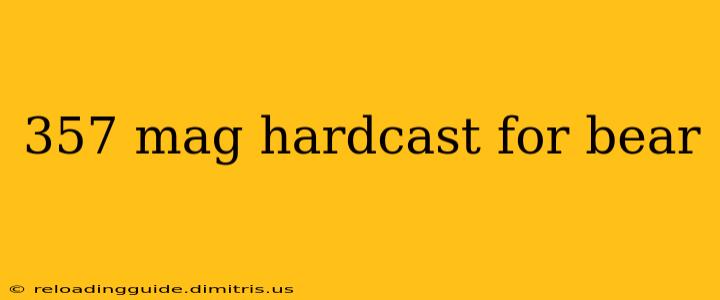Hunting bear requires serious firepower, and the .357 Magnum, while not the first choice for many, can be effective in the right hands with the right ammunition. Choosing the right hardcast bullet is crucial for success and safety. This guide delves into the specifics of selecting .357 Magnum hardcast bullets for bear hunting, covering factors like bullet weight, construction, and ethical considerations.
Understanding Hardcast Bullets
Hardcast bullets, unlike jacketed bullets, have a solid lead core with an often-added alloy for increased hardness and durability. This makes them ideal for hunting tough game like bear due to their superior penetration capabilities. The hardness helps them resist deformation upon impact, ensuring deeper penetration and a higher likelihood of reaching vital organs. This is especially critical when hunting larger bears, where a less robust bullet might fail to deliver sufficient stopping power.
Key Considerations for Bear Hunting:
-
Bullet Weight: Heavier bullets (180-255 grains) generally offer superior penetration and energy transfer, crucial for taking down a large bear. Lighter bullets may lack the necessary stopping power.
-
Bullet Design: Look for bullets with a flat-nosed or semi-wadcutter design. These designs offer better expansion and weight retention compared to round-nosed bullets, crucial for maximum impact on the target. Some hunters prefer a wide, flat-nosed bullet specifically for bear defense.
-
Alloy Composition: The alloy used in the hardcast bullet significantly influences its performance. A harder alloy will increase penetration but might decrease expansion. A balance needs to be found based on your hunting style and bear size. Look for information on the specific alloy used by the manufacturer.
-
Manufacturer Reputation: Choose bullets from reputable manufacturers with a proven track record of producing high-quality, reliable ammunition. Researching manufacturers and reading reviews from other hunters can provide valuable insight into the performance of different hardcast bullets.
Ethical Considerations
Ethical bear hunting demands responsible ammunition selection. While hardcast bullets offer superior penetration, it's crucial to ensure a clean, humane kill. Over-penetration, though less of a concern with hardcast bullets than with some full metal jacket options, can still be an issue. Accurate shot placement is paramount, regardless of the ammunition used.
Proper shot placement is the single most important factor in a quick and humane kill. Aim for vital areas such as the heart and lungs. A well-placed shot with a properly selected hardcast bullet will dramatically increase the likelihood of a clean and ethical harvest.
Beyond the Bullet: Other Factors Affecting Success
The bullet is just one piece of the puzzle. Successful bear hunting also depends on:
-
Rifle Choice: A strong, reliable revolver or carbine chambered in .357 Magnum is essential. Ensure your firearm is properly maintained and functions flawlessly.
-
Sight Alignment and Practice: Accurate shooting is crucial. Spend ample time practicing at the range to ensure your proficiency before heading into bear country.
-
Understanding Bear Behavior: Familiarize yourself with the behavior and habits of the bear species you're hunting. This knowledge greatly improves your safety and the likelihood of a successful hunt.
-
Safety Precautions: Always prioritize safety. Hunt with a partner, carry bear spray, and follow all relevant safety regulations.
Conclusion
Choosing the right .357 Magnum hardcast bullet for bear hunting requires careful consideration of several factors. Selecting a heavier bullet with a suitable design and alloy composition from a reputable manufacturer is vital for ensuring both a successful hunt and an ethical kill. Remember, responsible hunting practices, proper shot placement, and thorough preparation are just as critical as choosing the right ammunition. Always prioritize safety and ethical hunting practices.

